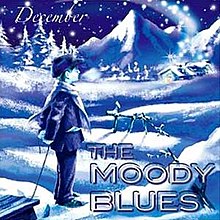
The Moody Blues were an English rock band formed in Birmingham in May 1964. The band initially consisted of drummer Graeme Edge, guitarist/vocalist Denny Laine, keyboardist/vocalist Mike Pinder, multi-instrumentalist/vocalist Ray Thomas, and bassist/vocalist Clint Warwick. Originally part of the British beat and R&B scene of the early–mid 1960s, the band came to prominence with the UK No. 1 and US Top 10 single "Go Now" in late 1964/early 1965. Laine and Warwick left the band by the end of 1966, being replaced by guitarist/vocalist Justin Hayward and bassist/vocalist John Lodge. They embraced the psychedelic rock movement of the late 1960s, with their second album, 1967's Days of Future Passed, being a fusion of rock with classical music that established the band as pioneers in the development of art rock and progressive rock. It has been described as a "landmark" and "one of the first successful concept albums".

Days of Future Passed is the second album and first concept album by English progressive rock band the Moody Blues, released in November 1967 by Deram Records.

A Question of Balance is the sixth album by the Moody Blues, released in 1970. The album reached No. 1 in the United Kingdom and No. 3 in the United States.

On the Threshold of a Dream is the fourth album by the Moody Blues, released in April 1969 on the Deram label. The album reached the top of the album charts, the group's first No. 1 album in the UK. According to guitarist Justin Hayward, "I think Threshold is the defining album for the Moody Blues. And it's the one in the '60's that you would find in people's homes when you went, they would have that album."

"Happy Xmas (War Is Over)" is a Christmas song released in 1971 as a single by John & Yoko/The Plastic Ono Band with the Harlem Community Choir. It was the seventh single release by John Lennon outside his work with the Beatles. The song reached number four in the UK, where its release was delayed until November 1972, and has occasionally re-emerged on the UK Singles Chart, most notably after Lennon's murder in December 1980, when it peaked at number two.

David Justin Hayward is an English musician. He was the guitarist and frontman of the rock band the Moody Blues from 1966 until that group's dissolution in 2018. He became the group's principal vocalist and its most prolific songwriter over the 1967–1974 period, and composed several international hit singles for the band.
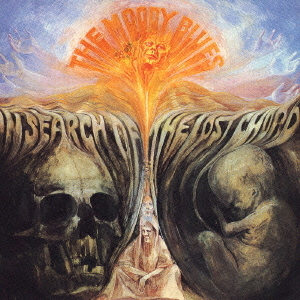
In Search of the Lost Chord is the third album by the Moody Blues, released in July 1968 on the Deram label.

To Our Children's Children's Children is the fifth album by the Moody Blues, released in November 1969.
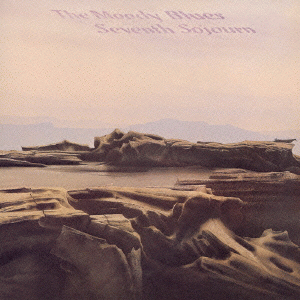
Seventh Sojourn is the eighth album by the Moody Blues, released in October 1972. The album reached No. 5 in the United Kingdom, and became the band's first American chart-topper, spending five weeks at No. 1 there to close out 1972.
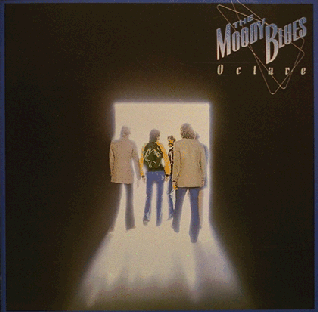
Octave is the ninth album by the Moody Blues, released in 1978, and their first release after a substantial hiatus following the success of the best-selling Seventh Sojourn in 1972. Released after a considerable break, which saw The Moody Blues returning in an era of punk music and disco, Octave produced a reduced commercial outcome for the band, but reached No. 6 in the United Kingdom and went platinum in the United States, where the album reached No. 13. The album produced the hit single "Steppin' in a Slide Zone", which hit No. 39 in the US, in addition to "Driftwood". The album's title is a musical pun: it references both the notion of an octave; and as a word derived from the Latin octavus it refers to this being the eighth album by this line-up of the Moody Blues.

Every Good Boy Deserves Favour is the seventh album by The Moody Blues, released in 1971. The album reached No. 1 on the British album chart, in addition to a three-week stay at No. 2 in the United States, and produced one top-40 single, "The Story in Your Eyes".
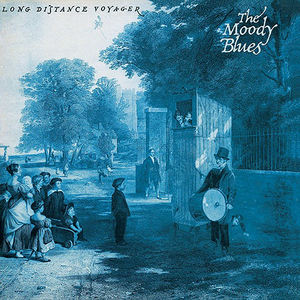
Long Distance Voyager is the tenth album by the Moody Blues, first released in May 1981 on the group's Threshold record label. It was the group's first album featuring keyboardist Patrick Moraz in place of co-founder Mike Pinder, who left after Octave in 1978.
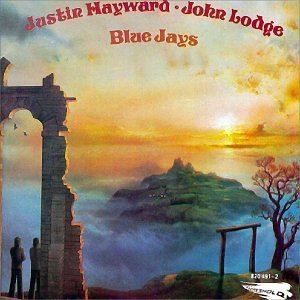
Blue Jays is a 1975 album by Justin Hayward and John Lodge. It was recorded and released during the Moody Blues' five-year hiatus.

The Other Side of Life is the twelfth studio album by English progressive rock band the Moody Blues, released in April 1986 by Polydor Records.

Graeme Charles Edge was an English musician, songwriter and poet, best known as the co-founder and drummer of the English band the Moody Blues. In addition to his work with the Moody Blues, Edge worked as the bandleader of his own outfit, the Graeme Edge Band. He contributed his talents to a variety of other projects throughout his career. In 2018, Edge was inducted into the Rock and Roll Hall of Fame as a member of the Moody Blues.
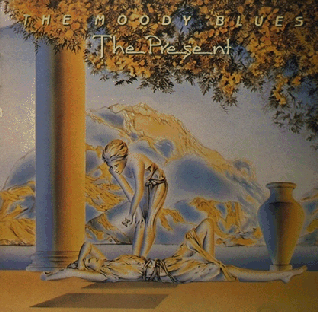
The Present is the eleventh album by the Moody Blues, released in 1983. This was the group's last original studio album to be released on their custom label, Threshold Records.

John Charles Lodge is an English musician, best known as bass guitarist, vocalist, and songwriter of the longstanding rock band the Moody Blues. He has also worked as a record producer and has collaborated with other musicians outside the band. In 2018, Lodge was inducted into the Rock and Roll Hall of Fame as a member of the Moody Blues.

Sur la Mer is the thirteenth album by the Moody Blues. It was released in 1988. It features the hit single "I Know You're Out There Somewhere", a sequel to their 1986 hit "Your Wildest Dreams". Much of the music on the album would fit in the "synthpop" genre, though it does incorporate more rock and acoustic influences than its predecessor.

Caught Live + 5 is a live album by The Moody Blues, consisting of a 12 December 1969 live show at the Royal Albert Hall and five previously unreleased studio recordings from 1967 to 1968.

Live at the Isle of Wight Festival 1970 is a live album by the Moody Blues that consists of their live performance at the Isle of Wight Festival in 1970. The album was released in 2008.
